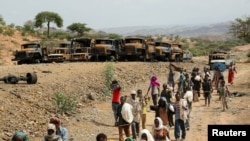A senior United Nations official is calling for a humanitarian cease-fire in northern Ethiopia to allow trucks carrying food and other relief supplies to reach millions of civilians in Tigray suffering from acute hunger and a lack of essential care.
The United Nations’ under-secretary-general for humanitarian affairs, Martin Griffiths, has just returned from a six-day mission to Ethiopia. He says U.N. relief trucks finally are rolling into Tigray.
He says 178 trucks, which have been stuck in the neighboring Afar region for the past two weeks, have been given the go-ahead to move toward the beleaguered province. While he welcomes this, Griffiths says 100 trucks every day need to get into Tigray to meet the overwhelming needs of the civilian population.
The Ethiopian government declared a unilateral cease-fire in Tigray on May 8. Since then, he notes the shooting war in the conflict-ridden province has diminished. Consequently, he says aid agencies can proceed into areas that previously were out of bounds.
"Once the supplies arrive at the moment in Tigray, the access for the agencies in Tigray is relatively good … They have access," Griffiths said. "But they have not had the supplies needed to actually exploit the access. So, a lot, a lot still to be done in an environment in Ethiopia, which I would say is very, very fragile.”
The World Food Program reports 4 million people in Tigray are suffering from acute hunger, with more than 400,000 on the brink of famine. Griffiths says WFP, which leads the humanitarian effort, has assured him that it can keep the pipeline of 100 trucks of supplies going into Tigray every day, if allowed to do so.
The U.N. official says offensive military action must stop and a humanitarian cease-fire is a glaring necessity.
"I welcomed the [Ethiopian] prime minister’s declaration of some weeks ago of a unilateral cease-fire," Griffiths said. "We need to build on that. Make it reciprocal and give people of Tigray, and their neighbors now, half a chance of survival in these next months of desperate needs.”
Griffiths has expressed concern about the Tigray conflict spilling over into neighboring regions. He notes some 100,000 people have been displaced in the Amhara region and another 70,000 people in the Afar region.






